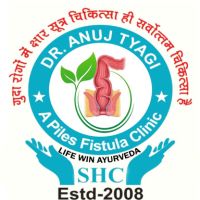
Guidelines for a Successful Recovery After Kshar Sutra Treatment
Kshar Sutra treatment is a traditional Ayurvedic procedure widely recognized for its effectiveness in managing anal fistulas and other related ailments.
At the Piles Fistula Clinic in Ghaziabad, we prioritize not just the treatment but also the post-operative care of our patients. Recovery after Kshar Sutra treatment is crucial for achieving optimal results and ensuring the well-being of patients.
In this blog, we will explore essential guidelines for a successful recovery after undergoing Kshar Sutra treatment, helping patients navigate this important phase of their healing journey.
Understanding Kshar Sutra Treatment
Before diving into recovery tips, it's essential to understand what Kshar Sutra treatment entails. This minimally invasive procedure uses a medicated thread (Kshar Sutra) to treat anal fistulas.
The Kshar Sutra promotes healing by gradually cutting through the fistulous tract while also aiding in the prevention of recurrence.
As patients undergo this treatment, they can expect less pain and a quicker recovery compared to traditional surgical methods.
Why Recovery Guidelines Matter
Recovery from any medical procedure is just as important as the treatment itself. Adhering to recovery guidelines helps reduce the risk of complications, promotes healing, and improves overall patient satisfaction.
At the Piles Fistula Clinic in Ghaziabad, we emphasize the importance of following these guidelines to ensure the best possible outcome after Kshar Sutra treatment.
Follow Post-Operative Instructions
After Kshar Sutra treatment, patients will receive specific post-operative instructions from their healthcare provider. These may include:
- Wound Care: Keep the treated area clean and dry to prevent infections. Follow the recommended bathing techniques and avoid soaking in water.
- Dietary Recommendations: A diet rich in fiber can help prevent constipation and reduce straining during bowel movements. Include fruits, vegetables, and whole grains in your meals.
- Medication Adherence: If prescribed, take medications as directed. Pain relievers or antibiotics can help manage discomfort and prevent infections.
Maintain Hygiene
Proper hygiene is paramount after Kshar Sutra treatment. Here are some hygiene tips to follow:
- Cleanse Regularly: Gently clean the anal area with warm water after each bowel movement. Avoid using harsh soaps or chemicals that can irritate the skin.
- Use Soft Materials: Opt for soft, breathable fabrics for underwear to minimize friction and irritation.
- Avoid Straining: Do not strain during bowel movements. This can exacerbate discomfort and impede healing.
Manage Pain and Discomfort
Post-operative discomfort is common after Kshar Sutra treatment. Here’s how to manage it effectively:
- Follow Pain Management Protocols: If pain medication is prescribed, take it as directed. Over-the-counter pain relievers may also be effective, but consult your doctor before taking any new medicines.
- Cold Compress: Applying a cold compress to the area can help reduce swelling and numb the pain. Ensure the compress is not too cold to prevent skin damage.
Monitor Your Symptoms
Vigilance in monitoring your recovery progress is crucial. Look out for the following signs:
- Increased Pain or Swelling: If pain intensifies or swelling worsens, contact your healthcare provider immediately.
- Fever or Chills: A fever may indicate infection, requiring prompt medical attention.
- Changes in Bowel Movements: Any significant changes in bowel habits or rectal bleeding should be reported.
Follow-Up Appointments
Regular follow-up appointments are critical for assessing recovery and ensuring proper healing. During these visits, your healthcare provider will:
- Evaluate Healing Progress: Assess the treated area to ensure it’s healing properly.
- Adjust Treatment Plans: Make any necessary adjustments to your treatment based on your recovery.
Lifestyle Adjustments
Adopting certain lifestyle changes can significantly enhance recovery after Kshar Sutra treatment:
- Stay Hydrated: Drinking plenty of fluids helps maintain soft stools, reducing the risk of straining during bowel movements.
- Physical Activity: While strenuous activities should be avoided initially, gentle walks can promote circulation and aid healing.
- Stress Management: High stress levels can negatively impact recovery. Engage in relaxation techniques such as yoga, meditation, or deep breathing exercises.
Nutrition for Healing
A well-balanced diet plays a vital role in recovery. Consider these dietary recommendations:
- Fiber-Rich Foods: Incorporate foods high in fiber, such as fruits, vegetables, and legumes, to prevent constipation.
- Healthy Fats: Include healthy fats like avocados and olive oil to support overall health.
- Limit Processed Foods: Minimize intake of processed foods and sugars that can hinder the healing process.
Emotional Well-Being
Recovery is not just a physical process; emotional well-being is equally important. Some tips include:
- Seek Support: Connect with family, friends, or support groups for emotional support during recovery.
- Be Patient: Understand that recovery takes time. Set realistic expectations for your healing journey.
Conclusion
Recovering from Kshar Sutra treatment is an integral part of ensuring lasting health and well-being. By following these guidelines, patients at the Piles Clinic in Ghaziabad can optimize their recovery experience and minimize the risk of complications.
Remember, each patient’s journey is unique, so it’s essential to listen to your body and consult your healthcare provider with any concerns.
